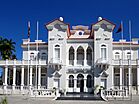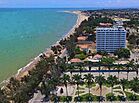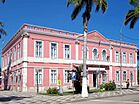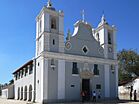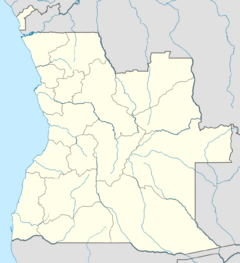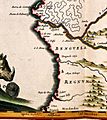Benguela facts for kids
Quick facts for kids
Benguela
|
||
|---|---|---|
|
Municipality
|
||
|
||
| Country | Angola | |
| Admin. division | Benguela Province | |
| Founded | 1617 | |
| Area | ||
| • Total | 2,332 km2 (900 sq mi) | |
| Elevation | 39 m (128 ft) | |
| Population
(2014 Census)
|
||
| • Total | 561,775 | |
| • Estimate
(2022)
|
692,202 | |
| • Density | 240.90/km2 (623.92/sq mi) | |
| Climate | BWh | |
Benguela is a large city in western Angola. It is the capital of Benguela Province. Benguela is one of the most populated cities in Angola. In 2014, about 555,124 people lived in the city itself, and 561,775 in the wider municipality area.
Contents
Discovering Benguela's Past
How Benguela Was Founded
Benguela was started in 1617 by the Portuguese. Its original name was São Felipe de Benguela. Manuel Cerveira Pereira, who was the governor of Angola at the time, played a key role in its founding.
For a long time, Benguela was an important trading hub. Ships would anchor about 1 kilometer (0.6 miles) offshore. Goods were then moved to smaller boats that used jetties in the town.
Growth and Development
Over the years, Benguela grew and became more prosperous. In the early 1900s, the Benguela Railway was built. This railway connected Benguela and the nearby deep-water port of Lobito to the inner parts of the country. It was very successful, especially when it linked up with the Copperbelt region in DR Congo and Zambia.
From the early 1900s until 1974, Benguela's economy boomed. Industries like sisal farming and fishing grew. The city also saw growth in finance, construction, and other services.
Benguela After Independence
In 1975, Angola became independent from Portugal. After independence, the country faced a long period of conflict called the Angolan Civil War (1975–2002). This war greatly affected Benguela. The important Benguela railway line stopped working, except for a short 30-kilometer (19-mile) section between Benguela and Lobito.
During the civil war, many people moved to Benguela from the countryside seeking safety. This caused the city's population to grow a lot. By 1983, about 155,000 people lived there.
Benguela in the 21st Century
In the mid-2000s, as peace returned to Angola, work began to fix the railway line. The railway between Benguela and Huambo was restored. While the older parts of the city have good quality homes, many people who moved to Benguela during the war still live in less developed areas.
Getting Around Benguela
Transportation Links
Benguela has its own airport, called Benguela Airport. The city is also connected by the Benguela Railway, which helps people and goods travel to and from the city.
Benguela's Economy
Trade and Industry
Benguela has always been a key trading center. It connects the western and eastern parts of Angola. Products like coffee, corn, sisal, sugarcane, and tobacco are grown in the inner regions of Angola and are often traded in Benguela.
Manganese, a type of metal, from the interior is also traded here. Benguela has industries that process fish and mill sugarcane. The city also makes pottery, soap, and tools.
Port of Lobito
Most of Benguela's international trade goes through the large port of Lobito. Lobito is about 29 kilometers (18 miles) north of Benguela. It was once the busiest port in Angola. The Angolan Civil War caused a lot of damage to the port, but it has since recovered and supports trade for the Benguela region.
Learning in Benguela
Higher Education
The Universidade Katyavala Bwila and Ruvandro Ferreira is a university in Benguela. It was founded in 2009.
Culture and Faith
Places of Worship
In Benguela, you can find many Christian churches and temples. These include:
- The Roman Catholic Diocese of Benguela (part of the Catholic Church)
- The Evangelical Congregational Church in Angola
- The Evangelical Reformed Church in Angola
- The Baptist Convention of Angola
- The Universal Church of the Kingdom of God
- The Assemblies of God
Famous People from Benguela
- Maria Araújo Kahn (born 1963/1964), a judge on the Connecticut Supreme Court
- Leila Lopes (born 1986), who was Miss Angola 2010 and Miss Universe 2011
- Matias Damásio (born 1982), a musician
- Luís Sá Silva (born 1990), a racing driver
Images for kids
See also
 In Spanish: Benguela para niños
In Spanish: Benguela para niños
 | Frances Mary Albrier |
 | Whitney Young |
 | Muhammad Ali |


